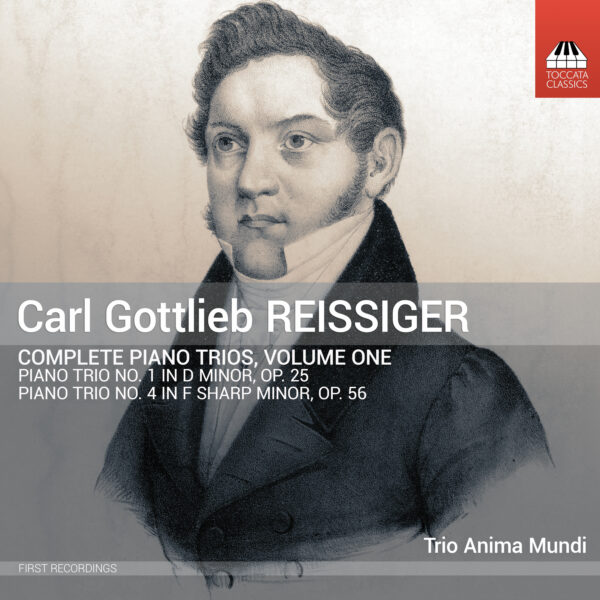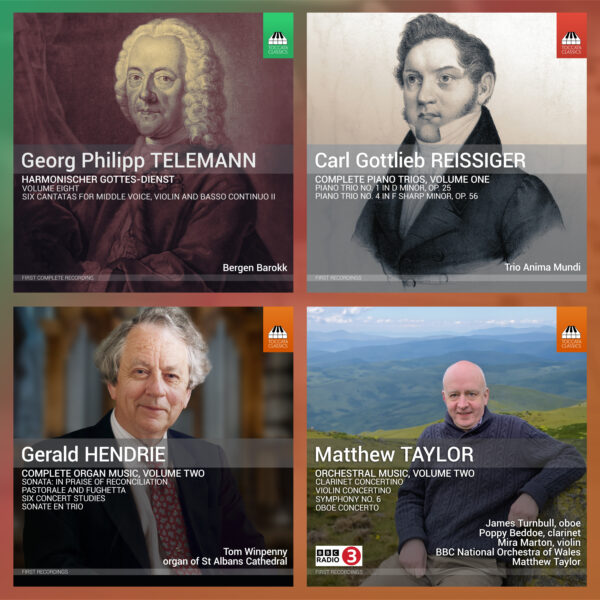Carl Gottlieb Reissiger: Complete Piano Trios, Volume One
In his day the now-forgotten Carl Gottlieb Reissiger (1798–1859) was highly esteemed, both as conductor and composer; indeed, his presence in Dresden from 1826 made it one of the main operatic centres in Germany. He wrote nine operas himself, as well as a huge quantity of vocal music (including at least twelve Masses), and his large output of chamber music boasts no fewer than 27 piano trios. These two early exemplars in this first-ever complete recorded cycle of those trios have a Mendelssohnian elegance and clarity, deepened here and there by a touch of Beethovenian pathos. Schumann was an enthusiast: ‘When I think of Reissiger’s trios, the words lovely and jewel-like come to mind. These choice and lovely works remind one of a chain of flowers. […] His music never fatigues the ear, but holds our attention to the very end’.
Trio Anima Mundi
Listen To This Recording:
Piano Trio No 1 in D minor, Op. 25 (c. 1824) (29:08)
- I. Moderato – Allegro passionato (10:38)
- II. Andante quasi allegretto (6:15)
- III. Capricci (Allegro molto) and Trio (3:51)
- IV. Finale: Allegro non troppo (8:29)
Piano Trio No. 4 in F sharp minor, Op. 56 (publ. 1829) (34:24)
- I. Allegro moderato (11:23)
- II. Andante non troppo (9:28)
- III. Scherzo: Prestissimo – Trio (5:42)
- IV. Rondo: Allegro con grazia (7:47)


Fanfare Magazine :
‘The music is well-crafted and pleasing to the ear […]
I find [Andante movement of his D-Minor Trio] moving and deeply satisfying. […]
[D-Minor Trio] is music that finds no shame in being beautiful—a first movement filled with arias and drama fit for an opera, a moderately slow movement full of Romantic ardor and longing, a Scherzo, titled Capriccio, that Mendelssohn would have envied, and a finale with a Hungaro-Gypsy dance that Brahms might have taken notice of. […]
With the commitment of Toccata Classics to raise forgotten composers from their slumbers, and an ensemble as superb as the Trio Anima Mundi to breathe new life into them, Carl Gottlieb Reissiger and we express our gratitude. These three outstanding musicians—Rochelle Ughetti, violin; Noella Yan, cello; and Kenji Fujimura, piano—project the Romantic spirit of these trios with richness of tone and fulness of feeling. I can only hope they will remain on board for the rest of this important project. There are only 25 more trios to go.’
—Jerry Dubins, Fanfare Magazine, February 2025
Charlottesville Classical :
‘The Trio Anima Mundi are quite talented musicians. And quite ambitious. […]
These trios are well-written and well-organized pieces of music.
The trios remind me of Mendelssohn. There’s clarity and straightforward simplicity at work here. And I personally found it appealing, and not derivative at all.
The Trio Anima Mundi delivers some sensitive readings. They keep the music light and transparent. […] There’s a lot to like here. On to volume 2!’
—Ralph Graves, Charlottesville Classical
American Record Guide :
‘They owe more to Mozart than to Beethoven, but two centuries later we can enjoy this music as it is. He viewed trios as a grouping of 3 equally important instruments, and that lends novelty and variety to the writing. The performances are warmly rendered and precise […].
The booklet is a model of its kind, with a lengthy biography, abundant quotations from historical sources, and musical analysis. In fact, it barely fits in the jewel case!’
—John Dutterer, American Record Guide